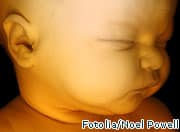Pregnant women should be told that having an abortion is safer than giving birth to their baby, according to controversial new advice from a major medical group.
Critics have slammed the contentious advice and accused the Royal College of Obstetricians and Gynaecologists (RCOG) of pursuing an “absurdly liberal agenda”.
The RCOG’s draft guidance on caring for women seeking an abortion advises health professionals: “Women should be advised that abortion is generally safer than continuing a pregnancy to term.”
Abortion
The controversial guidance also recommends that women seeking an abortion should be told that most of the women who have an abortion do not experience adverse psychological effects.
But Josephine Quintavalle, of campaign group Comment on Reproductive Ethics, warned that the guidance had been written from a pro-abortion perspective.
She said: “I don’t believe that most women considering abortions are worried it will kill them or are worrying about dying in childbirth; this is a blatant attempt to force an absurdly liberal agenda on women when they are at their most vulnerable.”
Dismayed
And commentator Melanie Phillips, who describes abortion as a “necessary evil”, lamented that the abortion debate now focuses solely on “the interests of the mother”.
She added: “It is dismaying indeed – even if not altogether surprising – that even doctors specialising in bringing babies into the world have succumbed to this savage reductionism.”
And while she acknowledged that giving birth “as a procedure” may be more dangerous than abortion she warned against any attempt to manipulate women.
She said: “But to imply that having a baby is a dangerous procedure is a disreputable piece of scaremongering. It amounts to the psychological manipulation of women who are already in a vulnerable state. It is a form of bullying and a gross abuse of medical power.”
Ignored
Dr Trevor Stammers, a former GP and a lecturer in medical ethics at St Mary’s University College in Surrey, warned that the RCOG had ignored one of the most authoritative studies into the psychiatric effects of abortion.
He said: “When they can’t refute the evidence, they have just ignored it. This is an absolutely disgraceful stitch up that they have forced through quickly.”
And speaking in a personal capacity Professor Patricia Casey, a consultant psychiatrist and fellow of the Royal College of Psychiatrists, said: “The message this sends out is very worrying.
“There are more than 30 studies showing an association between psychological trauma and abortion.”
Trauma
However Ann Furedi, chief executive of the British Pregnancy Advisory Service, said: “This guidance isn’t a political document and isn’t trying to persuade women to have abortions.”
The RCOG’s review of the draft abortion guidance, entitled The Care of Women Requesting Induced Abortion, closed last Friday and the medical group has now said that it will rewrite some of its recommendations.
Last month Dr Peter Saunders, chief executive of the Christian Medical Fellowship, questioned the transparency of the review and warned that those charged with revising the controversial document were “almost exclusively ‘pro-choice'”.
Questioned
He criticised the make-up of the ‘multi-professional group’ charged with reviewing the RCOG’s guidance.
This group included representatives from the nation’s two largest abortion providers BPAS and Marie Stopes International.
It also included representatives from the RCOG, the RCOG’s Faculty of Sexual and Reproductive Health and the Royal College of General Practitioners.
Vested
But Dr Saunders cautioned: “Asking this group to comment objectively and honestly about the physical and psychological consequences of abortion for women is like asking Philip Morris or BAT to review the health consequences of smoking or Macdonald’s to outline the adverse effects of fast food consumption.
“There are simply too many financial and ideological vested interests at stake that threaten a fair assessment.”


